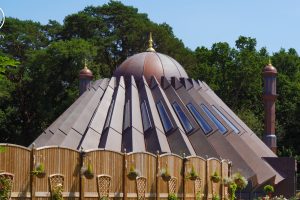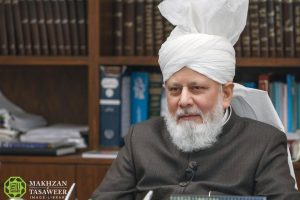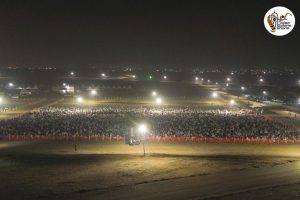Syed Amer Safir

Every decade a survey is held in Holland called ‘God in Nederland’. The recent survey shows that in all of Europe, the country with one of the highest percentages of people who declare they are ‘unaffiliated’ with any religion – even more so than France, Germany and the UK – is Holland. Over 50% of the population said they had no link with religion and only around 28% believe there is a higher power, down from 36% around ten years ago.
It is a tall order indeed then, to attempt to propagate a message of God to a nation where increasingly people believe there isn’t a God. Against this backdrop a worldwide religious leader arrived this Wednesday evening in Nunspeet, Holland, to do exactly that – to convey a message to the Dutch people that God still exists today and that there is a higher spiritual power.
Hazrat Mirza Masroor Ahmad (aba) is the Worldwide Head of the Ahmadiyya Muslim Community, the 5th Khalifa (Caliph), and arrived in Nunspeet just after 8pm. He has visited Holland many times before. The key event will see the Caliph addressing a three-day annual convention called the Jalsa Salana starting on Friday with many members expected from other European countries as well. In addition, the Caliph will be inaugurating a new mosque in Almere later during the visit, 55km away. In 2015, the Caliph laid the foundation stone for this new mosque, which will be the second purpose-built mosque of the Community in the country. At the time the Caliph said the following:
‘I should also make it clear that as mosques are considered to be houses of Allah, they are open to all peace-loving people. Our mosques have no hidden agendas, and nor are they built for any secret purposes. Rather the doors to this and indeed all true mosques will forever be open. I am also confident that once the mosque is built, the local Ahmadi Muslims will… prove to the world that Ahmadiyya mosques are beacons of peace that illuminate society with love, benevolence and mutual respect.’
The Ahmadiyya Muslim Community is now established in over 200 countries with tens of millions of members; however, the Community in Holland is a relatively small one of only just over 1600 members. In the days prior to the arrival of the Caliph, members old and young could be seen frantically making final preparations. Being a small community, they summoned every ounce of energy to work day and night. Even young children were giving a helping hand, grabbing brooms to help sweep the ground clean. Women too are a main part of the preparations and worked tirelessly to do their part.
The Ahmadiyya Muslim Community was founded in 1889 by Hazrat Mirza Ghulam Ahmad (as) of Qadian, India. Hazrat Ahmad (as) declared he was the second coming of Jesus (as) according to prophecies of past scriptures. He had come to reform Islam and restore it to its original state and to unite all mankind under the final law of the Holy Qur’an. A spiritual system of Khilafat (Caliphate) or Successorship was established after his demise which continues to this day.
As the Fifth Caliph arrived to the Baitul Nur Mosque in Nunspeet, men, women and children of the Ahmadiyya Muslim Community had lined up eagerly along the beautiful tranquil forest road to welcome their spiritual leader and sing songs. The Caliph had left his residence in Islamabad, Tilford, UK, that same morning, travelling by car, crossing the channel to Calais in France and then on to Nunspeet.
Indeed, Nunspeet stands against all the statistics outlined in the opening paragraph of this article. Where the majority of Holland is proudly non-religious, the people of Nunspeet are proudly religious. On a visit to Nunspeet town, most people we interviewed would passionately proclaim ‘Jesus as our Lord Saviour’ and hold firm to their Christian beliefs. More research uncovered that there is a strip of Holland known as the ‘Bible Belt’, similar to the USA, where there is the highest proportion of Christians. Nunspeet falls within the ‘Bible Belt’ and here the churches are regularly attended and a large population consider themselves to be devout Protestant Christians.
Interestingly therefore, the Caliph has come to a town which is part of the devoutly Christian Bible Belt of Holland, but in a country which as a whole is largely non-religious.

We met with Jaap, a neighbour whose house is closest to the mosque, where he has lived with his wife Margaret for six years. He worked for the Dutch army for 30 years during which time he served in Sudan for 6 months: ‘In Sudan I witnessed the people happily living on one square meal a day. They had no interest in buying a second car and other luxuries’. He told me that they were devout Christians attending church regularly, typical of the Bible Belt. Were they scared of living next to a mosque, considering the perception of Muslims nowadays? ‘No, the people of this mosque are very open and friendly,’ he said. ‘There are different types of Muslims,’ added Margaret, ‘just like there are different types of Christians. Not all are the same. The people of this mosque are different.’
Jaap had welcomed the Caliph the last time he visited Holland in 2015, coming out of his home and standing outside the entrance to the Caliph’s residence to receive him with others. Margaret told me, ‘the last time the Caliph came, due to the extra security, my daughter who lives in Amsterdam and happened to arrive here on the same day as the Caliph said to me, “I have never felt so safe returning home at night!”’ Jaap once again happily joined with the others to receive the Caliph on his current visit. He was stood beside the Deputy Mayor, Gert van den Berg, when the Caliph arrived. ‘I had a good meeting with your Caliph and I said welcome to Nunspeet. He was very happy to see us and is a very nice person. Now I am going home to have a coffee!’

After arrival, there was no rest for the Caliph; rather, he attended to his duties. Islam prescribes five daily prayers to be performed in congregation. The five daily prayers are led by the Caliph wherever in the world he is. The Caliph, after reaching Nunspeet, led the evening prayers called Maghreb and Ishaa in the mosque before finally retiring to his residence after a long journey.





Add Comment